The processing, recycling and upcycling of all waste produced at Alila Hotels & Resorts’ four Bali properties addresses the island’s dire pollution problem.

Alila Ubud (designed by Kerry Hill Architects)
January 4th, 2019
The pollution that is becoming ever more apparent in Bali doesn’t just jolt dreamy vacationers into a heavy reality; it makes a mockery of the island’s reputation as a holiday idyll.
“We have four hotels there and we’re constantly telling people how beautiful it is there and why they should go… but the reality is that it’s quite a heavily polluted island and seaway around Indonesia,” says Guy Heywood, the COO of Two Roads Hospitality Asia, the operator for Alila.* He cites studies that have identified Indonesia as the world’s second-largest polluter of marine plastics after China. (See the data for yourself here.)
“Every year at the start of the rainy season, which is around October-November, heavy rains come and all the pollution from the villages all over the island gets washed down into the rivers and eventually out into the ocean. It comes back up onto the beaches every morning. Organisations like ourselves and other hotels then spend four-to-five hours cleaning the beach… It’s really sad.” – Guy Heywood
Bali’s main landfill site, he adds, not only creates a bad smell (on top of methane), but strong winds blow its top layer into an adjacent wakeboarding park.
Hotel owners and operators would naturally be among the first to realise the need to act for the ongoing viability of their businesses, aside from concern for the environmental health of one of the world’s most beautiful places and its residents.
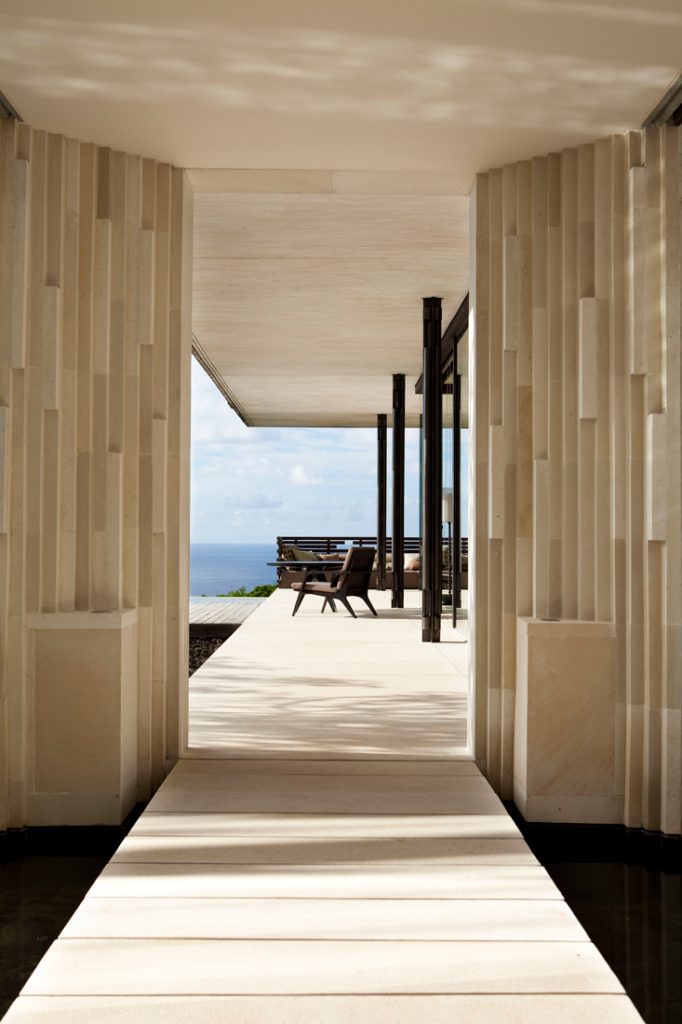
Alila Villas Uluwatu (designed by WOHA)
Alila Hotels & Resorts took accountability for the impact of its own operations at its four Bali properties and announced the launch in August 2016 of its ‘Zero Waste to Landfill’ initiative. Tackling the pollution problem at its source, the initiative applies to all four of Alila’s Bali properties: Alila Villas Uluwatu, Alila Ubud, Alila Manggis and Alila Seminyak.
By late 2018, the brand was able to announce that all mechanisms for achieving zero waste to landfill have been fully established. It has also embarked on community engagement projects to encourage local communities to think differently about waste and to hopefully catalyse other businesses into similar action.
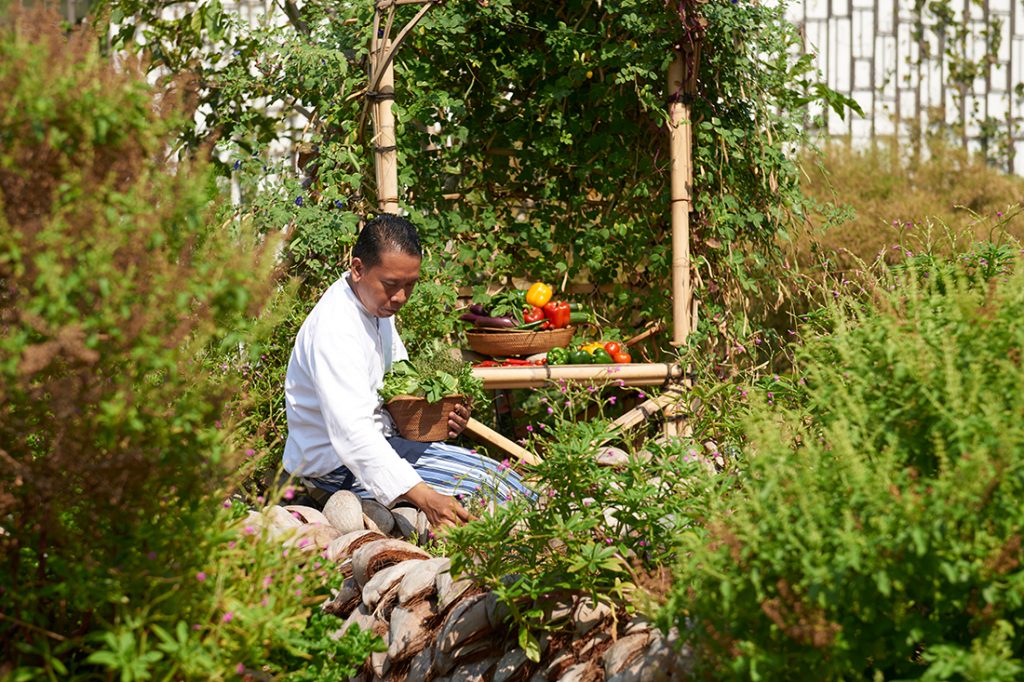
Harvesting at an organic garden at Alila Seminyak
“It’s quite complex getting yourself to a situation of zero waste to landfill,” says Heywood. In a year, he explains, Alila’s four Bali properties – with 156,000 rooms available and 60-70-per-cent occupancy – produce 500 tonnes of waste. “And we’re only small properties,” he adds. “They’re quite staggering numbers.”
At the heart of Alila’s Zero Waste Policy for its Bali properties is its Integrated Sustainable Resource Recovery Facilities (iSuRRFs) – on-site laboratories where a hotel’s waste streams are recycled or upcycled through mechanical and biological systems. Each iSuRRF is housed in 20-foot sea containers clad in a natural material (such as bamboo) in keeping with the surroundings.
The majority of Alila’s waste, explains Heywood, is organic waste (86 per cent of the total). Garden waste and paper waste is composted on site and used on the hotel gardens – including new organic food gardens that are utilised as part of the guest experience program and for kitchens. 75 per cent of Alilia’s food waste is fermented into animal feed, some of which is sold to nearby pig farmers. The rest is composted with the garden waste.
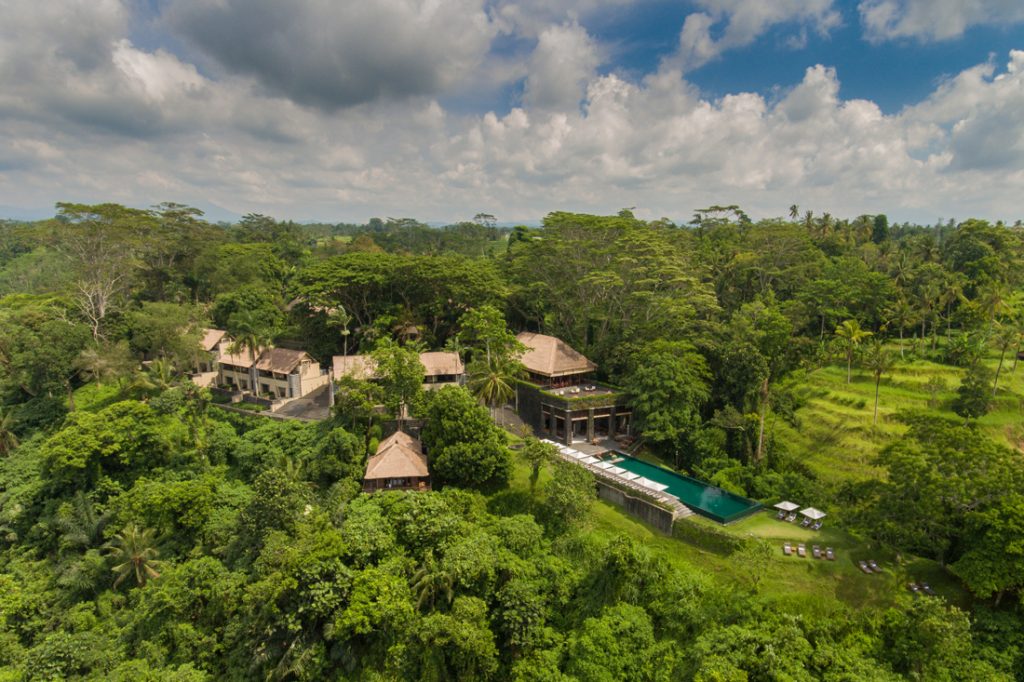
Alila Ubud (designed by Kerry Hill Architects)
Glass, plastics and metals are sorted on site before being either processed or sent off-property to be recycled by third parties. Certain plastics, glass and ceramics are crushed on site and mixed into an aggregate for the creation of slabs and tiles, which are either used on site or sold.
Uneconomical waste plastics (such as the problematic plastic label wrappers on plastic water bottles and other films) are converted into a light crude oil that is distilled down to diesel, kerosene and gasoline for reuse in the hotels.
“One of the hardest things we found to recycle is slippers. They have fabric on the inside and cardboard in the middle, so you can’t wash them because of the cardboard, and they won’t decompose either… We’re changing to washable rubber slippers made from used tyres. In the mean time, we are washing and breaking down the slippers we do have and turning them into pillow stuffing.” – Guy Heywood
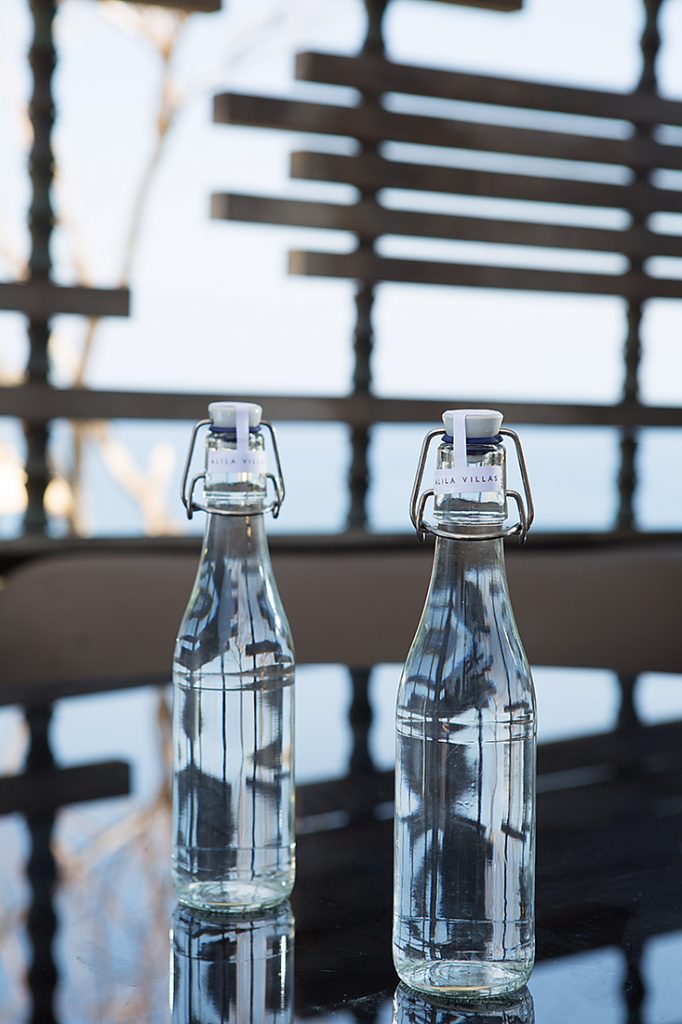
Water bottled in glass on site at Alila Villas Uluwatu
But plastic bottles are the biggest problem, he adds. “In most of our properties we’ve installed water-bottling plants. We’ll filter and bottle our own water [serving it in reusable glass bottles], and test it every month with an independent third-party organisation.”
New properties are being planned with space for iSuRRFs on the grounds. Attention is also being paid to other initiatives such as solar panelling.
“There are a lot of people doing a lot of great things in Bali – a lot of NGOs and organisations are helping out, and it’s fantastic,” says Heywood. “The biggest problem is that government doesn’t really get on board. Unless you tackle the issue at the grass roots level, it’s hard to make a big impact.”
Education and community outreach are therefore cornerstones of Alila’s efforts. Each Bali hotel works with a local charity and school, he explains, via sponsorship, donation and education programs. “At Alila Manggis in east Bali, for example,” he says, “we buy plastics and garbage from the kids. They bring the garbage to the property, we weight it and pay them based on the weight. We’re trying to get them thinking about their own villages and communities, and how they can also play a part.”
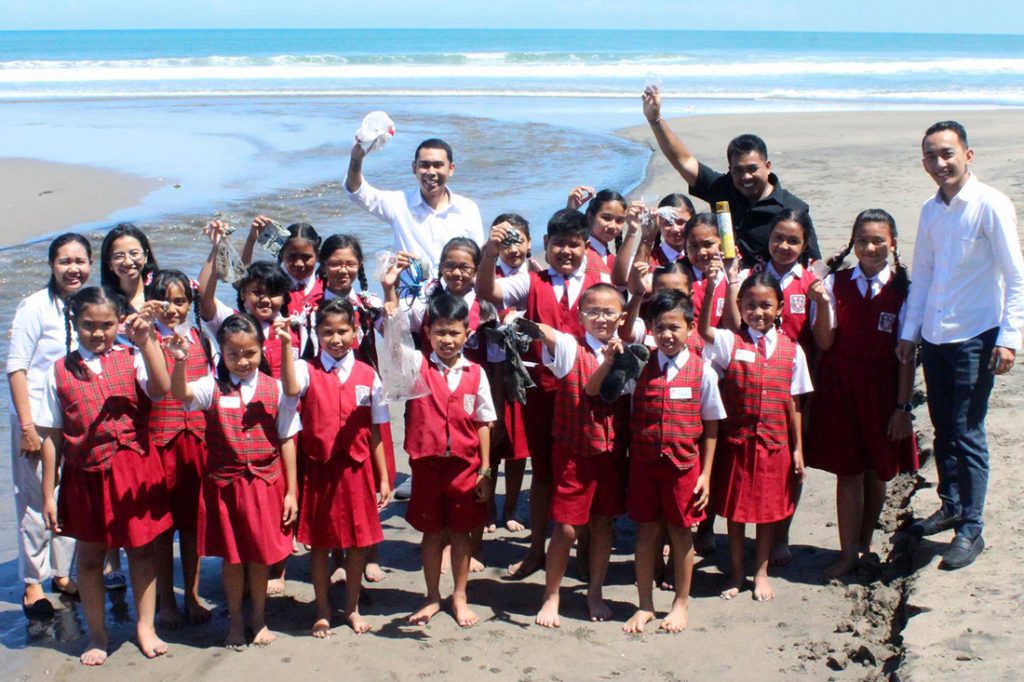
Balinese kids collecting plastic at Seminyak
In Seminyak, in response to the pollution of the hotel’s adjacent river, Alila introduced dams and catfish upstream to address some of the pollution (the catfish being efficient at eating some of the solid waste that finds its way into the river).
“We have 1,000 team members in Indonesia. They all have family living and working in the villages. If we cam educate them, they can also take that message back to their communities and hopefully seed some change… The biggest problem will always be, if there isn’t any infrastructure, what do you expect them to do?” – Guy Heywood
“There should be checks and balances. The problem with our industry is it’s quite unregulated… You’ve got organisations like EarthCheck and LEED. They are third parties that will accredit you, but it’s not compulsory,” explains Heywood.
The ability of a traveller to make an informed decision is undermined by the lack of benchmarking of hotels from an environmental point of view, he suggests. “TripAdvisor would be a great independent organisation to get on board with something like this, and start rating hotels from an environmental point of view.”
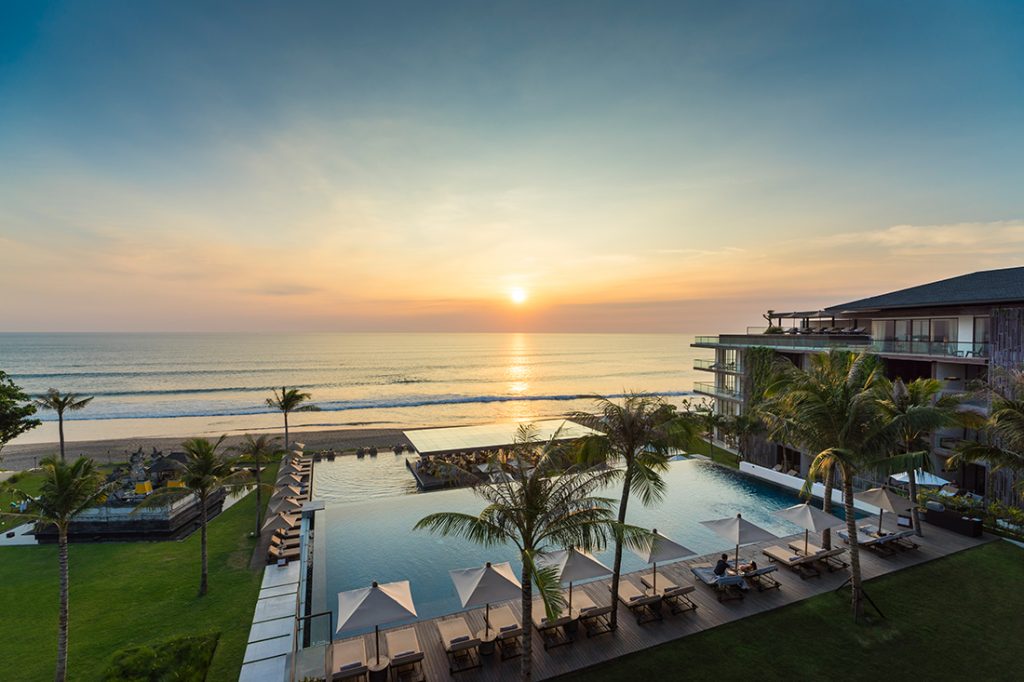
Alila Seminyak (designed by URBNarc)
Alila intends to roll out its iSuRRF initiative at its other properties, and, says Heywood, designing properties with sustainability in mind is now standard for the brand. But how important is sustainability to the average guest? The hard evidence is lacking.
“Travelling a lot like I do, going to sales conferences, talking to a lot of trade and press, and from what I read, [it seems] that [guests] are more aware and want to do the right thing,” he says, adding that the airline industry’s on-board consumption of plastics is well overdue for change. Hear hear.
*Two Roads Hospitality was recently acquired by the Hyatt Corporation. All images courtesy of Alila Hotels & Resorts.
A searchable and comprehensive guide for specifying leading products and their suppliers
Keep up to date with the latest and greatest from our industry BFF's!

Create a configuration to suit your needs with this curved collection.

Suitable for applications ranging from schools and retail outlets to computer rooms and X-ray suites, Palettone comes in two varieties and a choice of more than fifty colours.

The Sub-Zero Wolf showrooms in Sydney and Melbourne provide a creative experience unlike any other. Now showcasing all-new product ranges, the showrooms present a unique perspective on the future of kitchens, homes and lifestyles.

Savage Design’s approach to understanding the relationship between design concepts and user experience, particularly with metalwork, transcends traditional boundaries, blending timeless craftsmanship with digital innovation to create enduring elegance in objects, furnishings, and door furniture.

We spoke with Jeffrey Wilkes of WILKESDESIGN about the John Portman-designed building, which has been infused with touches of local culture and colour.

Adaptive reuse is all the rage across the design industry, and rightly so. Here, we present a selection of articles on this most effective approach to sustainability.
The internet never sleeps! Here's the stuff you might have missed

Paying homage to that wonderful tool of life, the book, SJK Architects’ design for the new headquarters of Penguin Random House is both a temple to the library and a captivating place to work.

Boasting unmatched cooking and food preservation capabilities, Sub-Zero and Wolf enable designers to set a new standard for kitchen design, and inspire a higher quality of culinary experience.